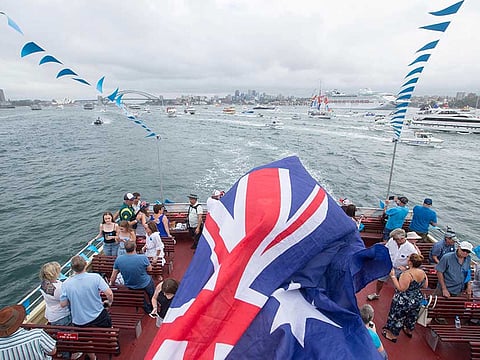Amid controversy, PM rules out changing Australia Day date
PM questions why government should be ‘bullied’ by ‘a tiny minority’ of people who want to move date from 26 January

Canberra: Malcolm Turnbull says the date of Australia Day will not change as long as he is prime minister.
Turnbull gave the assurance to News Corp columnist Miranda Devine in a broad-ranging interview on Monday in which he also dampened expectations for income tax cuts, which he described as a “priority” that was secondary to budget balance.
Responding to a Greens push earlier in January, Turnbull said he was “disappointed” in the proposal to move the date of Australia Day from 26 January, because a “free country debates its history, it does not deny it”.
The overwhelming majority of Australians want to keep Australia Day on the 26th of January and agree with the patriotic sentiments we’re expressing.”
On Friday Labor’s shadow infrastructure minister, Anthony Albanese, reinvigorated the debate by calling for two referendums to be held on Australia Day in 2019 on whether Australia should become a republic and whether to recognise Indigenous Australians in the constitution.
On Monday Albanese told Radio National that 26 January was “a day of great sadness for Indigenous people” but his proposal “would change the meaning, rather than change the date”.
Turnbull questioned why the government should be “bullied” by “a tiny minority” of people who want to change the date.
“The overwhelming majority of Australians want to keep Australia Day on the 26th of January and agree with the patriotic sentiments we’re expressing,” he said.
Asked if there would be “no change” under his leadership, Turnbull replied: “I can give you that assurance.”
While many polls suggest that most do not want a change of date, a recent poll by the Australia Institute found that, when the question was asked the other way around, most were not concerned if the day were moved.
Turnbull lauded the fact the Australian economy had added 1,000 jobs a day, three-quarters of which were full-time, describing it as “the highest level of jobs growth since records began”.
He said it was “fantastic” that ratings agencies had confirmed Australia’s triple-A credit rating last week but warnings about budget repair were “very real”.
“We are on track to bring the budget back into balance in 2020-21,” he said. “We’re not going to miss that achievement, that goal, that is absolutely critical.”
Asked about personal income tax cuts, Turnbull noted the government had already lifted the threshold for the second highest tax bracket from $80,000 (Dh293,800) to $87,000.
He said the government’s next priority was “middle-income tax relief” but the goal was secondary to bringing the budget back to balance.
“The timing of that, and the extent of it, is going to depend on the state of the budget because we’re not going to sacrifice our return to surplus, that is the top priority,” he said. “We want every Australian to understand that our priority here in 2018 is to put more money into the pockets of hardworking Australian families and businesses.”
Labor has ridiculed the suggestion of income tax cuts, labelling it a thought bubble and noting the government increased tax rates on those earning more than $21,000 in the last budget.
Turnbull noted the International Monetary Fund had lifted its global growth forecasts in part because of the Trump tax plan. The head of the IMF, Christine Lagarde, has also warned the Trump tax cuts could destabilise the global economy.
“Donald Trump is delivering on economic leadership, that’s for sure,” Turnbull said.
Turnbull said he had read Michael Wolff’s account of the Trump Whitehouse, Fire and Fury.
The prime minister described it as “sensational” — in the pejorative sense of the word — but suggested he did not want to get into “book criticism”.
Asked about subsidies for “clean coal”, Turnbull said there was “no need to” because “there is plenty of capital in the energy sector”.
He said he believed the national energy guarantee would reduce wholesale electricity prices “significantly over the next decade”.


